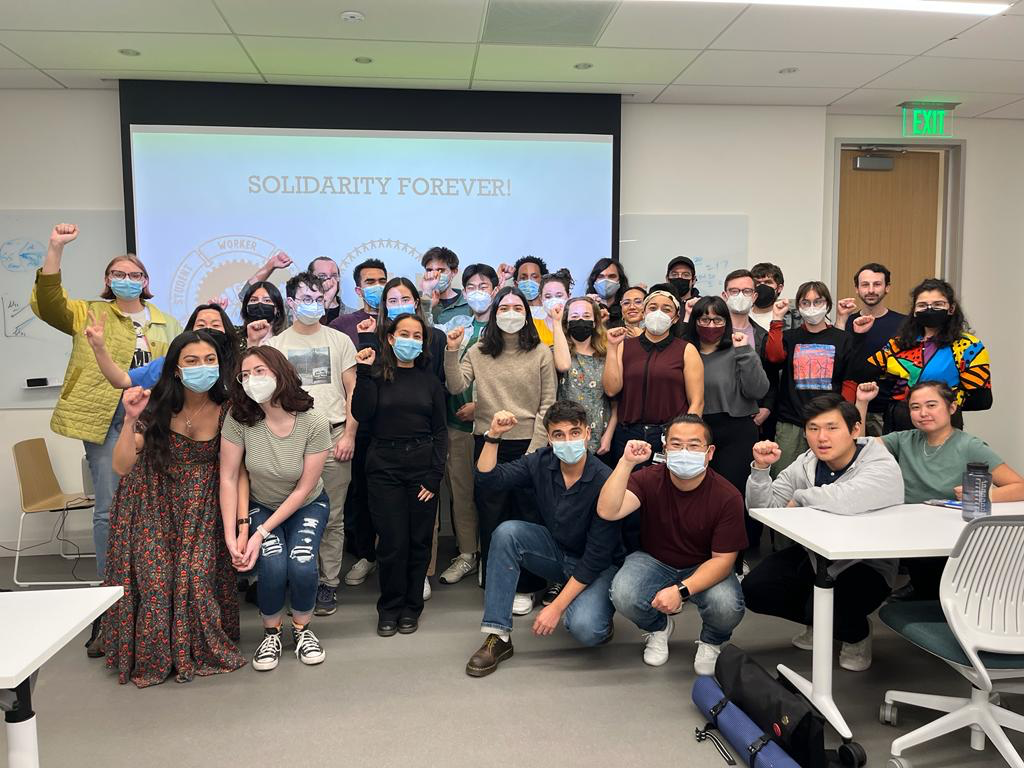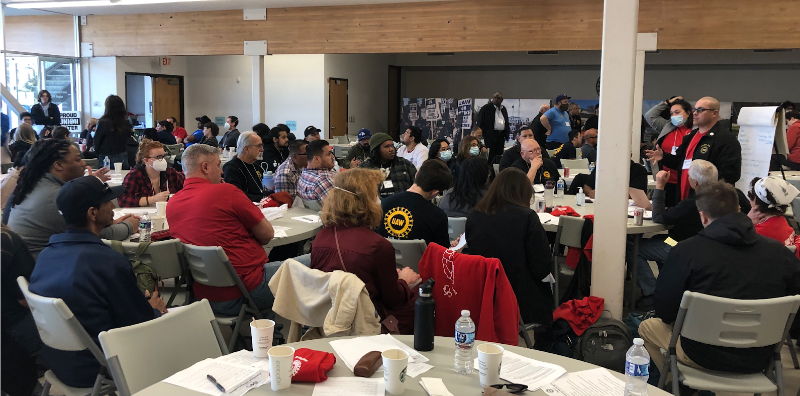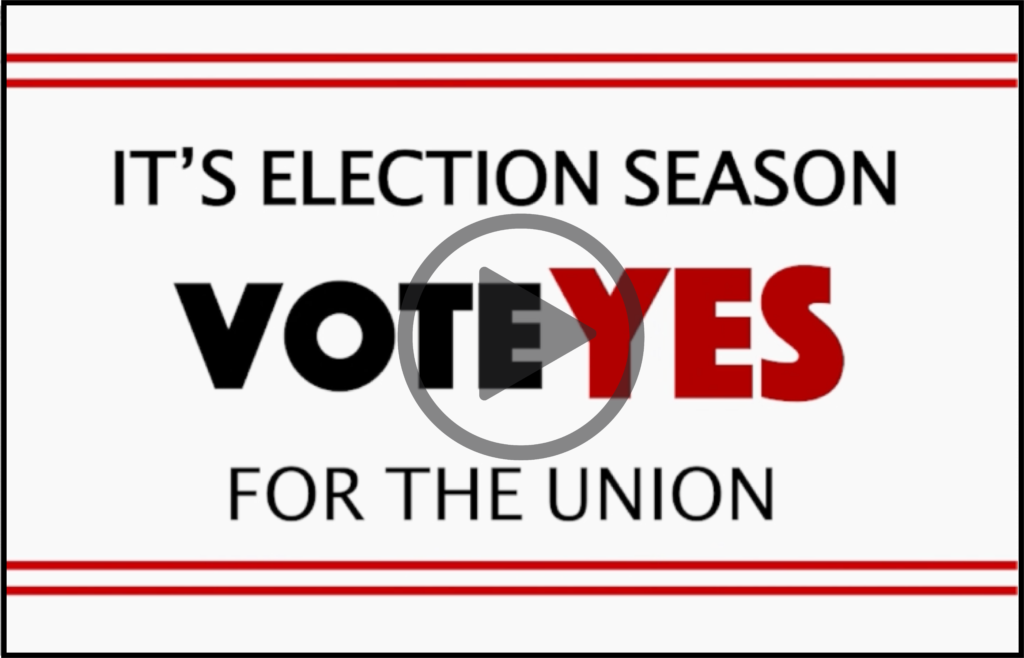February 13, 2023
On February 15 and 16, we have the opportunity to vote YES to demonstrate to USC administration that Grad Student Workers are ready to work together to bargain for better workplaces. Fundamentally, forming a union is about us having the right to democratically negotiate to improve our working conditions. By working together, we can address problems like earning less than a living wage, insufficient healthcare benefits, discrimination, bullying and harassment, and a lack of legal and structural support for international workers. You can read more about the many reasons GSWs across USC are voting yes here, as well as full voting times and locations.
After we vote YES to form our union, we will elect a bargaining team of our peers, democratically decide on initial bargaining demands, all have the opportunity to participate in the process of bargaining a union contract with USC administration, and then vote on whether or not to ratify any agreement before it goes into effect. Over 100,000 other academic employees, including Grad Employees, Postdocs, Research Scientists, and Non-Tenure Track Faculty, are already part of UAW, and thousands more have joined in this year alone. Together, we are driving up standards in higher education – including higher wages, better benefits, and stronger workplace protections.
USC administration has been clear – they oppose our forming a union. This is unfortunate, but not surprising. By unionizing, USC administration will be required to negotiate with Grad Student Workers in good faith and face greater accountability. It’s critical that all of us as Grad Students are well informed – please take a moment to read what USC left out from their misleading FAQs here and the full FAQ on our website here.
We also want to address a few questions posed by USC administration in their latest email directly below:
If the United Auto Workers wins, can I still agree with my professor on special TA or RA arrangements to meet my personal situation?
No other union of academic employees has negotiated a contract that limits graduate employees’ flexible working conditions – and it’s difficult to imagine that we, as Grad Student Workers, would ever vote to ratify a contract that does. In fact, if anything, academic unions have fought to expand workplace flexibility. For example, during the COVID-19 pandemic unions at the UC campuses fought for the right of international employees to remain abroad and work remotely.
In the event an individual student has a problem in their workplace, with a union they can have far greater support. Other unions have negotiated the right to a formal grievance process that includes enforceable timelines, the ability to appeal to a neutral third party, and the right to have the support of a union representative throughout the process. This leads to far more favorable outcomes for grad student employees.
Does union membership cost money?
Union dues in UAW are determined democratically. They are currently 1.44% of gross pay and only go into effect after we negotiate and vote to ratify a union contract. In all other cases, the value of wage and benefit increases far exceeds the cost of union dues for all graduate employees. Dues are how workers, like us, pool resources to be able to successfully negotiate with multi-billion dollar employers, like USC.
It will also be up to us, as GSWs, to decide what kind of union security arrangement we want to negotiate for. Some institutions, like NYU, have a provision in their contract that generally requires all grad employees to pay dues or a comparable fee. Others, like Columbia and Harvard, do not have such a provision and dues are opt-in. You can read more about dues and how they are used here.
How does the new United Auto Workers-University of California contract compare with what USC graduate students already receive?
You can read details of what was won in the University of California contract here. Some highlights:
- 25% – 80% in wage increase over 2.5 years
- Dependent healthcare
- 8 weeks of paid parental leave
- Strong protections from abusive conduct, harassment, and bullying
- Strong protections from unfair termination
- And much more
Crucially, UC Grad Student Workers are also able to negotiate consistently every 1 – 5 years (the next round of contract negotiations will begin in 2 years). This ensures that wage increases and other improvements happen consistently, rather than the status quo at USC, where administration can (and has) frozen wages for years.
It is abundantly clear that grad student workers in the UC system are far, far better off than they were before forming a union – and they have expressed their support for us forming a union here at USC. It is incredibly misleading for USC to imply that grad students at UC are somehow worse off after winning massive raises, substantial improvements in benefits packages, and historic workplace protections.

UCLA Graduate Employees in solidarity with USC Graduate Employees
If the United Auto Workers wins the election, will there be a strike?
As GSWs, we may choose to go on strike if USC administration acts in bad faith or refuses to agree to a fair contract. Effective strikes require broad participation and support, and are generally planned well in advance. Since we are joining UAW, a strike must also be authorized by a 2/3rds vote.
No Graduate Student Worker can be compelled or forced to go on strike. The ability to engage in a protected strike can be a powerful form of leverage in union contract negotiations, however, and we view it as a tactic of last resort.
Additionally, one benefit of joining UAW is that if we do choose to go on strike, we will have access to UAW’s strike fund to ensure striking workers continue to receive pay (currently $400/wk) and benefits during a strike.
How will I know if the United Auto Workers is the right union to represent me?
GSWOC-UAW is by, of, and for Grad Student Workers at USC. We chose to partner with UAW because of their track record of success. Over 100,000 thousand academic employees are already part of UAW, with thousands more having joined just in the past year. Together, UAW members in higher education are driving up standards across the entire industry.
We also chose to join UAW because of how UAW members responded to the corruption of a few union officials by enacting democratic reforms and new accountability measures. We’re proud to be joining a union that enacted real reforms – like moving to direct elections for all union officers – rather than engaging in surface-level changes and cover-ups. You can read more here.
Fundamentally, UAW is a member-driven organization whose mission is to increase worker power. Decisions are made democratically through direct elections, referendums, and conferences – and as GSWOC-UAW, USC grad employees will directly elect the leaders of our own union. In contrast, we have zero say in who is in USC administration, or who is on the USC board of trustees.

USC Grad Student Workers meeting with hundreds of other UAW members during the recent UAW Region 6 leadership conference
Does a union help graduate students on academic issues?
As Graduate Student Employees, we have dual roles both as students and as employees of USC. In union contract negotiations, mandatory topics of bargaining include our working conditions as employees like wages, benefits, and protections from harassment, discrimination, and abusive conduct. We can, however, choose to raise other issues that are important to us and push the University to agree to negotiate over them as well.
What happens if the United Auto Workers wins the election, but USC graduate students later decide they no longer want to be collectively represented by the United Auto Workers?
There is no shortage of right-wing organizations across the US that work to decertify labor unions. Nonetheless, workers choosing to decertify is rare and unions have high levels of support. No group of academic employees who joined UAW has ever sought to decertify. The overwhelming consensus is that by unionizing, academic employees have more rights and more power to democratically seek improved working conditions.
Once again, we urge all Grad Student Workers to join us in voting yes! Together we can build a better, more democratic USC.
In solidarity,
Piril Nergis, Electrical and Computer Engineering
Max Lien, Electrical and Computer Engineering
Megan Cassingham, Chemistry
Kyle Hulburd, Sociology
Maggie Davis, Sociology
Ellen Herschel, Psychology
Pragya Arya, Psychology
Ian Anderson, Psychology
Morgan Lynch, Psychology
Leslie Taylor, Psychology
Katie Googe, English
Zak Breckenridge, English
Yoni Hirshberg, Cinema and Media Studies
Lewis Brown, Cinema and Media Studies
Max Berwald, Cinema and Media Studies
Tania Sarfraz, Cinema and Media Studies
Jacqueline Johnson, Cinema and Media Studies
Sayan Ghosh, Computer Science
Sulyab Thottungal Valapu, Computer Science
Bixing Qiao, Mathematics
Sam Armon, Mathematics
J.E. Paguyo, Mathematics
Yash Somaiya, Mathematics
Julia Stal, Population and Public Health Sciences
Stepp Mayes, Civil and Environmental Engineering
Tristan McPhail, Chemical Engineering and Materials Science
Marley Randazzo, Price
Rebecca Stark, Neuroscience
Nancy Tran, Neuroscience
Jody Liu, Price
Maya Cratsley, Marshall School of Business
Ana Iwataki, Comparative Studies in Literature and Culture
Laboni Bhattacharya, Cinema and Media Studies
Jenna Dilworth, Marine and Environmental Biology
Ruiyi Li, Sociology
Maile McCann, Civil and Environmental Engineering
McKenna Peplinski, Civil and Environmental Engineering
Kritika Pandey, Sociology
James Eichenbaum, Biomedical Engineering
Lynne Cherchia, Biomedical Engineering
Tori Cassady, Earth Sciences
Maya Yanez, Earth Sciences
Andrew Stewart, Philosophy
Sina Baharlouei, Industrial and Systems Engineering
Andrew Janeiro, Molecular Biology
Ariel Vonk, Stem Cell
Miguel Hijar-Chiapa, Political Science and International Relations
Lauren Kelly, History
Meg Tiller, Religion
Daniel Delgado, History
AnnaBella Grant, History
Daniel Styrpejko, Molecular Biology
Shreya Bhardwaj, Economics
Wenda Ma, Economics
Jason Vu, ASE
Jaden Morales, ASE
Rocio Leon, ASE
Chris Chien, ASE
José Múzquiz, Political Science and International Relations
Raquel Centeno, Political Science and International Relations
Jair Peltier, Political Science and International Relations
Benjamin Zhang, Physics & Astronomy
Siddhesh Raut, Physics & Astronomy
Brian Kim, Computer Science
Danny Goodelman, Aerospace and Mechanical Engineering
James Fortwengler, Chemistry
Suyanpeng Zhang, Industrial and Systems Engineering
Linds Wise, Mathematics
Raymond Yu, Electrical and Computer Engineering
Lucia Dalle Ore, Chemical Engineering and Materials Science
Masao MacMaster, Marshall School of Business
DJ Fernandez, Molecular Microbiology and Immunology
Claire Crawford, Political Science & International Relations
Zalan Fabian, Electrical and Computer Engineering
Hamsini Sridharan, Annenberg

